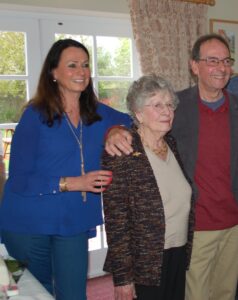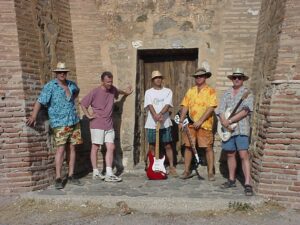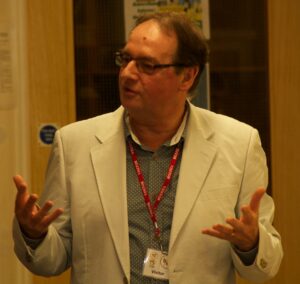
31 Mar 2025
David’s story: One life came to an end and another began
“One life came to an end and another began on that July day. I will never complain. I will never feel hard done by and I’ll forever be thankful for 12 (and counting) further years of life.”
David Bridges loved his job as an Assistant Head at a large secondary school where he taught Business Studies and French. He thrived on the pressure and demands of the role, committed to doing his best every day to support students and staff. In July 2012, when he began to experience intense fatigue and shortness of breath he just thought it was the usual end of term tiredness that tended to affect everybody after a long year or maybe just a virus. So David took a few days off work but didn’t visit his GP. Then, on Saturday 14th July 2012, things took a dramatic turn for the worse.
“My wife Dora found me unconscious in the bathroom at home,” said David, who was 60 at the time and lives in Chesham, Buckinghamshire. “It was the usual frantic end of the school year where everyone feels tired. But I’d taken a couple of days off as I thought I had flu. The last thing I remember was going to the bathroom thinking I was going to be sick, then I recall lying on the floor feeling completely calm, and the next thing I remember is waking up in the ambulance.”
David was being blue lighted to High Wycombe Hospital’s A&E department. Tests showed he had pneumonia along with abnormalities in his blood. He was transferred to Stoke Mandeville Hospital in Buckinghamshire, where he was admitted to intensive care for three days and underwent a barrage of further tests. Then the shock news came that he had acute myeloid leukaemia (AML).
“I was so ill that I didn’t really feel any negative emotions – it almost a sense of relief that I had a diagnosis, but I sensed the anxiety of my wife and children who were present. The best thing was when my consultant said: “You have got acute myeloid leukaemia but we’re going to go for a cure!” That immediately put me on a positive footing. I was determined to beat it and get better.”
Before David could start treatment for his leukaemia he was given strong antibiotics to fight his pneumonia. He was then transferred to a haematology ward at Stoke Mandeville hospital where he started the first of three rounds of chemotherapy.

David Bridges (right) with sister, Lisa, who donated her stem cells and his mum
“One of my chemo treatments was part of a research project which I agreed to be enrolled in. It was randomly generated by a computer as to which drug I got when, so I didn’t know which of the three treatments would be the trial drug. The sessions were a challenge, particularly the second session which, I think, was the randomly chosen one. They said it would normally given to younger patients but I was relatively fit and on my feet and on the move all the time as anyone who works in a school is, so they thought I would be a good candidate for it. I now know it was FLAG-Ida.”
FLAG-Ida is a specific combination of four drugs (fludarabine, cytarabine, granulocyte colony-stimulating factor, and idarubicin) which is now a common treatment for AML. It was being trailed in the early to mid-2000s. While FLAG (without Idarubicin) had been used since the 1990s, the addition of Idarubicin was being tested to improve remission rates. Trials showed promising results, with complete remission rates of 50-70% in relapsed AML, making it a preferred therapy when others have failed and a bridge to stem cell transplant. It has since become a standard treatment option.
David went into remission and in November 2012 it was decided that a bone marrow transplant would minimise the risk of him relapsing.
“I was admitted to Oxford Churchill Hospital on Jan 16th 2013 for the transplant where I had a final chemo to clear out my entire immune system before receiving bone marrow from my sister Lisa who, fortunately and unusually for a sibling, was a strong match. She still claims all the credit for my recovery!”

David with his guitar as a member of The Bullfrog Blues Band
David passed the time by playing the guitar – he was at the time a member of a band called the Bullfrog Blues Band – and enjoying the extra snacks his wife Dora bought in for him.
“I was told that I’d be there for two months but I was discharged after about six weeks, in mid-February. They said no one had recovered that quickly before.
“I was supported greatly by my consultants, nurses and all the healthcare workers. My family and friends kept everything normal by being positive and humorous. My wife supported me selflessly, staying with me in hospital almost every day and driving the hour to Oxford and back, in often terrible weather. My doctors said they were convinced that my positive attitude was critical to my recovery.”
By July 2013 David was signed off as being fit enough to go back to work on a shorter week. However he soon suffered breathing problems and was re-admitted to hospital.
“I thought ‘this is it, it’s back’. But the nurses and doctors stunned me by saying ‘that’s fantastic!’. They told me it was Graft vs Host Disease (GvHD) which was a positive sign that the new cells were working. However it made me realise that I couldn’t sustain the energy levels needed to give 100% to my job so I applied for early retirement.
“The school I worked for had been brilliantly supportive of me and my family throughout my illness – my wife and two daughters worked there as well – and I didn’t want to spend the last years of my career doing a job half-heartedly. However, I did continue my association with the school by being a school governor.

David at his retirement party after his AML treatment
“AML brought a premature end to my long teaching career, which I had loved, and put my nearest and dearest through significant worry and emotional upset. It brought a few financial and other worries into focus and prevented me from helping my sister to support our mother, who was in her late 80s, to the extent that I’d hoped. An experience like this doesn’t just affect the one struck down but, like ripples in a pond, sends waves across families and friends.
“However, it is now almost exactly 12 years since my transplant, I’m 73, and there has been no recurrence of AML. I do suffer from some digestive issues which may have been a result of my various treatments and have had a few other unrelated problems like kidney stones but it’s a small price to pay for extra time I’ve been fortunate enough to have been granted.

David at his daughter, Jenny’s, wedding in 2015
“One life came to an end and another began on that July day in 2012. A mark in the sand! I think of people who didn’t have the benefit of a supportive family or didn’t have access to a bone marrow donor. I saw youngsters who hadn’t had the life I’ve enjoyed, struck down by this terrible illness. I’ve been able to see my eldest daughter get married and walked her down the aisle. I’ve seen the birth of three grandchildren and been able to share their lives. I’ve been able to hold my mother’s hand while she took her last breath.
“I will never complain. I will never feel hard done by and I’ll forever be thankful for 12 (and counting) further years of life. I am a stronger person than I was before my illness and know the value of having a positive outlook, despite the doubts and voices in one’s ear. You never know what you’re made of until you come up against adversity.”
Related posts
2 August 2023
Friends and family of Leicestershire woman who died from rare cancer campaign for more research and awareness
The family of a Leicestershire woman who died in July 2022, on the day of her leukaemia diagnosis, has raised over £17,000 in her memory to support Leukaemia UK. On…
21 September 2022
A record year for Leukaemia UK London Marathon runners
62 runners put their best feet forward for Leukaemia UK A record 62 runners are taking part in this year’s London marathon to help fund vital research into leukaemia diagnosis,…
3 February 2022
New analysis reveals the stark disparities in cancer rates between ethnic groups
The Cancer Research UK study demonstrates the importance of understanding the differences and inequalities in cancer and to highlight where improvements in survival, treatment and care can be made.
16 November 2022
Cost of Living with Leukaemia Fund launches
Leukaemia Care and Leukaemia UK have launched a new financial support service, the Cost of Living with Leukaemia Fund, in response to the cost of living crisis in the UK….